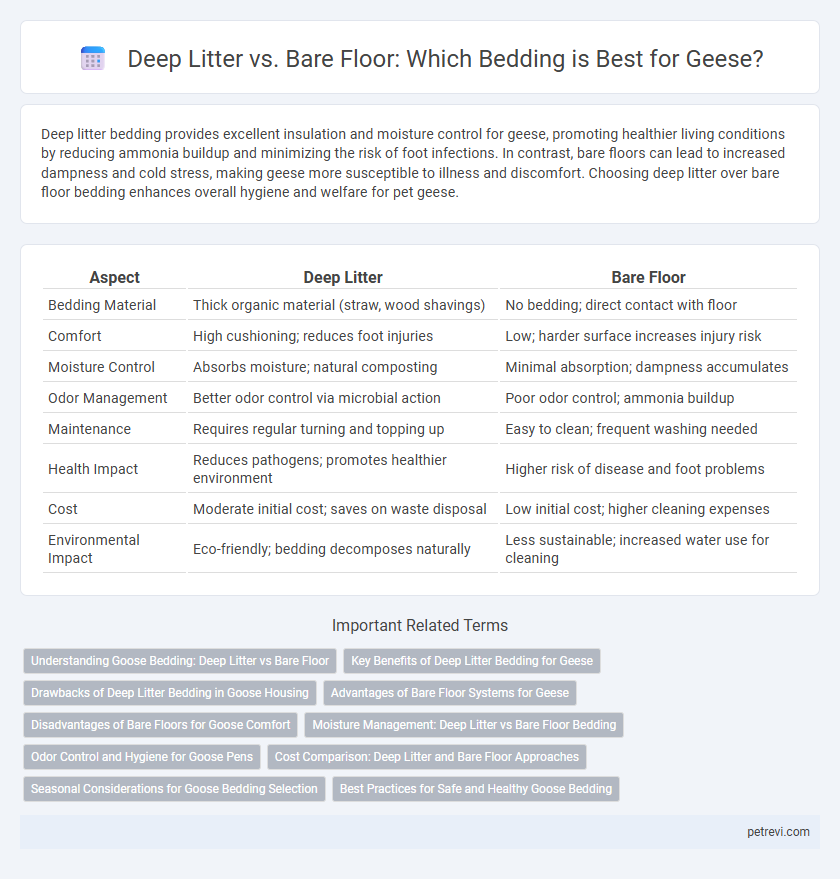Deep litter bedding provides excellent insulation and moisture control for geese, promoting healthier living conditions by reducing ammonia buildup and minimizing the risk of foot infections. In contrast, bare floors can lead to increased dampness and cold stress, making geese more susceptible to illness and discomfort. Choosing deep litter over bare floor bedding enhances overall hygiene and welfare for pet geese.
Table of Comparison
| Aspect | Deep Litter | Bare Floor |
|---|---|---|
| Bedding Material | Thick organic material (straw, wood shavings) | No bedding; direct contact with floor |
| Comfort | High cushioning; reduces foot injuries | Low; harder surface increases injury risk |
| Moisture Control | Absorbs moisture; natural composting | Minimal absorption; dampness accumulates |
| Odor Management | Better odor control via microbial action | Poor odor control; ammonia buildup |
| Maintenance | Requires regular turning and topping up | Easy to clean; frequent washing needed |
| Health Impact | Reduces pathogens; promotes healthier environment | Higher risk of disease and foot problems |
| Cost | Moderate initial cost; saves on waste disposal | Low initial cost; higher cleaning expenses |
| Environmental Impact | Eco-friendly; bedding decomposes naturally | Less sustainable; increased water use for cleaning |
Understanding Goose Bedding: Deep Litter vs Bare Floor
Deep litter bedding provides insulation and absorbs moisture, reducing ammonia buildup and promoting healthier respiratory conditions for geese. Bare floors, while easier to clean, can lead to increased stress and footpad injuries due to lack of cushioning and moisture control. Selecting deep litter optimizes comfort and hygiene by maintaining a drier, warmer environment that supports natural behaviors and reduces disease risks.
Key Benefits of Deep Litter Bedding for Geese
Deep litter bedding for geese improves moisture control by allowing composting of waste, which reduces odor and maintains a drier environment compared to bare floors. This method enhances insulation, keeping geese warmer in colder seasons and promoting better overall health. The accumulation of organic matter in deep litter supports beneficial microbial activity that helps suppress pathogens and minimizes the need for frequent cleaning.
Drawbacks of Deep Litter Bedding in Goose Housing
Deep litter bedding in goose housing can lead to excessive moisture retention, creating a humid environment that promotes the growth of harmful bacteria and parasites. The accumulation of ammonia from decomposing waste may cause respiratory issues and discomfort for geese. In contrast, bare floor systems offer easier cleaning and better control of pathogen buildup but may require more frequent maintenance to ensure hygiene.
Advantages of Bare Floor Systems for Geese
Bare floor systems for geese offer significant advantages including easier cleaning and better sanitation, which reduce the risk of disease and parasite buildup common in deep litter setups. These systems improve ventilation and moisture control, helping to maintain drier conditions that enhance bird health and comfort. Bare floors also facilitate more efficient waste management and can lower labor costs by simplifying bedding maintenance.
Disadvantages of Bare Floors for Goose Comfort
Bare floors for goose bedding often lead to increased discomfort due to poor insulation, causing geese to experience cold stress and decreased productivity. These surfaces can also contribute to higher incidences of footpad dermatitis and other injuries from constant contact with hard, cold, or wet flooring. Without adequate bedding, moisture accumulation leads to unsanitary conditions, promoting bacterial growth and respiratory issues among the flock.
Moisture Management: Deep Litter vs Bare Floor Bedding
Deep litter bedding provides superior moisture management for geese by absorbing and breaking down waste through microbial activity, reducing ammonia levels and maintaining drier conditions. In contrast, bare floor bedding tends to accumulate moisture quickly, increasing the risk of bacterial growth and respiratory issues in geese. Effective moisture control in deep litter systems promotes healthier living environments and minimizes the frequency of bedding replacement.
Odor Control and Hygiene for Goose Pens
Deep litter bedding for goose pens significantly improves odor control by allowing organic material to decompose gradually, reducing ammonia buildup and creating a healthier environment. The layered approach enhances moisture absorption and microbial activity, which helps maintain better hygiene compared to bare floor setups. Bare floors often lead to accumulated droppings and moisture, increasing odor and the risk of bacterial growth, thus requiring frequent cleaning to sustain pen cleanliness.
Cost Comparison: Deep Litter and Bare Floor Approaches
Deep litter bedding for geese involves initial material costs for straw or wood shavings but reduces long-term expenses through natural decomposition and lower cleaning frequency. Bare floor systems require less upfront investment but often incur higher maintenance costs due to frequent cleaning, bedding replacement, and potential health issues from inadequate waste absorption. Comparing cost efficiency, deep litter proves more economical over time by minimizing labor and material inputs while maintaining better environmental conditions for geese.
Seasonal Considerations for Goose Bedding Selection
Choosing between deep litter and bare floor bedding for geese depends on seasonal conditions, with deep litter providing insulation and moisture control during colder months. The deep litter system enhances warmth by allowing microbial activity to generate heat, reducing the risk of cold stress in winter. In contrast, bare floors are preferable in warmer seasons to prevent overheating and minimize the buildup of ammonia from moisture retention.
Best Practices for Safe and Healthy Goose Bedding
Deep litter systems for goose bedding promote natural composting processes, maintaining dry, warm, and odor-controlled environments that reduce harmful pathogen buildup. Bare floor setups require frequent cleaning and bedding replacement to prevent moisture accumulation and bacterial growth, which can lead to respiratory or foot problems in geese. Implementing deep litter with proper ventilation and regular turning optimizes microbial balance and reduces labor while ensuring safe, healthy conditions for geese.
Deep litter vs Bare floor for Goose bedding Infographic

 petrevi.com
petrevi.com